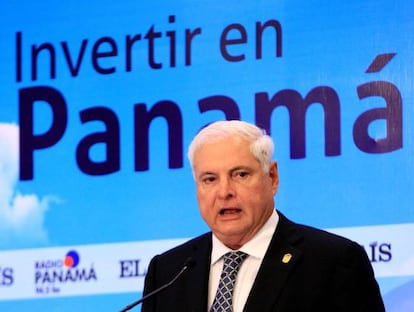Panama, a place for geopolitics to call home
Development and investment opportunities are on the rise in the isthmus nation

The opportunities for business and development that Panama offers, as well as the challenges and uncertainties the isthmus nation also faces, were the subjects of a debate Monday at a forum sponsored by EL PAÍS and PRISA Radio in Panama City, with the participation of international leaders and experts in various fields.
“When the Panama Canal was given back to us on December 31, 1999, not only was infrastructure delivered to us but we also regained a big part of our territory,” said Alberto Alemán, a former administrator in the Canal Zone.
Alemán explained to forum participants that Panama’s strategic location, a gateway between the Caribbean and the Pacific Ocean, has helped it become one of the most competitive countries in the region.
Panama has become a logistics platform for foreign investors and has experienced unprecedented growth over the past several decades. Panamanian Trade and Industries Minister Ricardo Quijano released figures to support the notion that his country has become a magnet for business opportunities.
“Panama is the Latin American country with the highest growth, with figures as high as 10.7 percent annually. The construction sector will grow at the end of the year by 10.11 percent, direct foreign investment has also increased since 2011 by some 28 percent with more than 90 transnational companies having established operations here – 47 of which are Spanish,” Quijano said.
Just by venturing out onto the streets in the capital, Panama City, one can see the “boom.” Construction is well underway on a subway system that should be inaugurated next year. Expansion is taking place at the Tocumen International Airport, as well as scores of new hotels being built. But the biggest infrastructure project taking place in Panama is the estimated $5-billion expansion of the Panama Canal, which currently handles traffic of some 144 vessels daily.
This golden moment for Panama has trickled down to its citizens who are currently enjoying a 4.5-percent unemployment rate – the lowest in 40 years.
While it has been difficult for Panama – or any other country for that matter – to arrive at such a period of expansion, it is even harder to preserve that status. How to continue on that route with so much uncertainty in the global markets was one of the questions asked by EL PAÍS Editor Javier Moreno to the participants. Specifically, he mentioned the slowdown of the Chinese economy, Europe’s financial crisis, and the United States, whose own economy has been unable to take off.
Four Spaniards come to Panama each day, and within a month they are legalized”
Some of the answers to his questions and how to offset the changes in the global markets included restructuring educational systems to adapt to the transformations; introducing improved training programs for citizens; establishing solid self-sustaining financial systems; and adopting clear and transparent rules for businesses to follow.
Ricaurte Vázquez, vice president for General Electric in Latin America, placed emphasis on the differences between economies that are open to trade and those with protectionist policies.
Latin America is becoming divided with the “Atlantic and the Pacific coasts on opposite sides, between those countries that do not favor private investment, which are more nationalistic and protectionist, like Brazil, and those Pacific nations which, with the exception of Ecuador, have free trade agreements with the United States.”
The GE executive also stressed the changes occurring in the United States, which is quickly switching from “an importer to an exporter of energy, now that shale gas will bring in a new reindustrialization of the country.”
Sergio Aranda, Gas Natural director for Latin America, warned that there must be intense planning for the future of the energy markets because “the United States will have cheaper energy than the European or Asian consumer.”
Jaime Bermúdez, who has served as Colombian foreign minister, said the biggest challenge for countries will be to meet “the growing demands from the middle class,” which were mirrored in last year’s violent demonstrations by students in Chile who are demanding better education opportunities.
Former Colombian President César Gaviria, who governed from 1990 to 1994, warned about the rash of privatizations in Argentina and Venezuela, which he called “terribly damaging” to these countries, because they prevent them from gaining access to technology and foreign capital.
Panamanian President Ricardo Martinelli closed the forum by describing his country as “a nation under construction” which has been able to attract large investments while at the same time providing a lot of employment opportunities to citizens and other people from abroad.
“Four Spaniards come to Panama each day, and within a month they legalize their residency situation,” the president said. Martinelli also said that poverty has been reduced from 38.5 percent to 25.5 percent in Panama over the past few years.
The forum was also sponsored by Bancolombia, Manzanillo International Terminal and the daily La Prensa.
Tu suscripción se está usando en otro dispositivo
¿Quieres añadir otro usuario a tu suscripción?
Si continúas leyendo en este dispositivo, no se podrá leer en el otro.
FlechaTu suscripción se está usando en otro dispositivo y solo puedes acceder a EL PAÍS desde un dispositivo a la vez.
Si quieres compartir tu cuenta, cambia tu suscripción a la modalidad Premium, así podrás añadir otro usuario. Cada uno accederá con su propia cuenta de email, lo que os permitirá personalizar vuestra experiencia en EL PAÍS.
¿Tienes una suscripción de empresa? Accede aquí para contratar más cuentas.
En el caso de no saber quién está usando tu cuenta, te recomendamos cambiar tu contraseña aquí.
Si decides continuar compartiendo tu cuenta, este mensaje se mostrará en tu dispositivo y en el de la otra persona que está usando tu cuenta de forma indefinida, afectando a tu experiencia de lectura. Puedes consultar aquí los términos y condiciones de la suscripción digital.








































